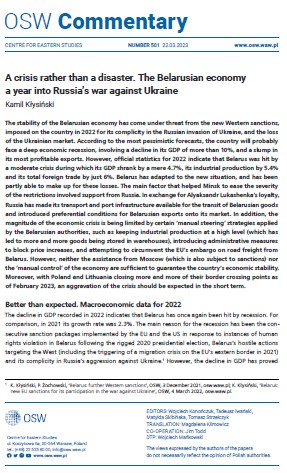A crisis rather than a disaster. The Belarusian economy a year into Russia’s war against Ukraine
A crisis rather than a disaster. The Belarusian economy a year into Russia’s war against Ukraine
Author(s): Kamil Kłysiński
Subject(s): National Economy, Economic policy, Government/Political systems, International relations/trade, Military policy, Political behavior, EU-Approach / EU-Accession / EU-Development, Peace and Conflict Studies, Russian Aggression against Ukraine
Published by: OSW Ośrodek Studiów Wschodnich im. Marka Karpia
Keywords: Belarusian economy; Russia-Ukraine War; Western sanctions; foreign trade policy; The (post-)Soviet management style;
Summary/Abstract: The stability of the Belarusian economy has come under threat from the new Western sanctions, imposed on the country in 2022 for its complicity in the Russian invasion of Ukraine, and the loss of the Ukrainian market. According to the most pessimistic forecasts, the country will probably face a deep economic recession, involving a decline in its GDP of more than 10%, and a slump in its most profitable exports. However, official statistics for 2022 indicate that Belarus was hit by a moderate crisis during which its GDP shrank by a mere 4.7%, its industrial production by 5.4%and its total foreign trade by just 6%. Belarus has adapted to the new situation, and has been partly able to make up for these losses. The main factor that helped Minsk to ease the severity of the restrictions involved support from Russia. In exchange for Alyaksandr Lukashenka’s loyalty, Russia has made its transport and port infrastructure available for the transit of Belarusian goods and introduced preferential conditions for Belarusian exports onto its market. In addition, the magnitude of the economic crisis is being limited by certain ‘manual steering’ strategies applied by the Belarusian authorities, such as keeping industrial production at a high level (which has led to more and more goods being stored in warehouses), introducing administrative measures to block price increases, and attempting to circumvent the EU’s embargo on road freight from Belarus. However, neither the assistance from Moscow (which is also subject to sanctions) nor the ‘manual control’ of the economy are sufficient to guarantee the country’s economic stability. Moreover, with Poland and Lithuania closing more and more of their border crossing points as of February 2023, an aggravation of the crisis should be expected in the short term.
Series: OSW Commentary
- Page Count: 7
- Publication Year: 2023
- Language: English
- Content File-PDF

